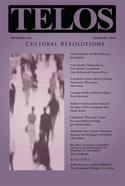Reem Bassiouney’s “Language and Revolution in Egypt” appears in Telos 163 (Summer 2013). Read the full version online at the Telos Online website, or purchase a print copy of the issue in our store.
 Based on the assumption that language is a social resource, this article contends that during political conflicts, issues of linguistic resources and access to them are disputed. Issues of inclusion and exclusion are predominant. Note that Egypt is a diglossic community, a community in which two language varieties exist each with a different function. Examples are drawn from Egyptian media directly before, during, and after the revolution of January 25, 2011. Two newspaper articles are analyzed in detail, as well as additional material from TV talk shows, films, Facebook pages, and poetry. The first section in this article outlines how linguists in the Arab world at large, and in Egypt in particular, have referred to the diglossic situation to explain and justify negative social and political phenomena, especially the lack of democracy. Section two discusses examples of linguistic manipulation that took place during the revolution and in which the Egyptian state media attempted to cast doubt on the identity and motivations of the protestors in Tahrir Square. The conflict was not one sided, and the Tahrir Square protestors counterattacked the state media through poetry and other means. The main contribution of this section is to show how the diglossic situation is used after the revolution to lay claims on political legitimacy and credibility of the revolutionaries rather than the pro-Mubarak group. In a final section, the concept of linguistic unrest is introduced and defined.
Based on the assumption that language is a social resource, this article contends that during political conflicts, issues of linguistic resources and access to them are disputed. Issues of inclusion and exclusion are predominant. Note that Egypt is a diglossic community, a community in which two language varieties exist each with a different function. Examples are drawn from Egyptian media directly before, during, and after the revolution of January 25, 2011. Two newspaper articles are analyzed in detail, as well as additional material from TV talk shows, films, Facebook pages, and poetry. The first section in this article outlines how linguists in the Arab world at large, and in Egypt in particular, have referred to the diglossic situation to explain and justify negative social and political phenomena, especially the lack of democracy. Section two discusses examples of linguistic manipulation that took place during the revolution and in which the Egyptian state media attempted to cast doubt on the identity and motivations of the protestors in Tahrir Square. The conflict was not one sided, and the Tahrir Square protestors counterattacked the state media through poetry and other means. The main contribution of this section is to show how the diglossic situation is used after the revolution to lay claims on political legitimacy and credibility of the revolutionaries rather than the pro-Mubarak group. In a final section, the concept of linguistic unrest is introduced and defined.







